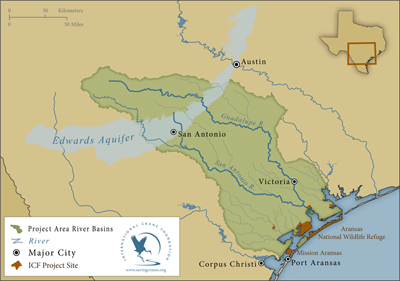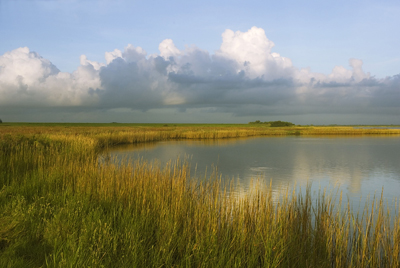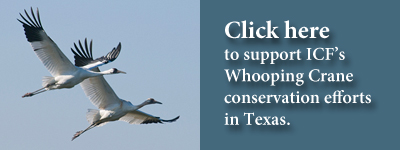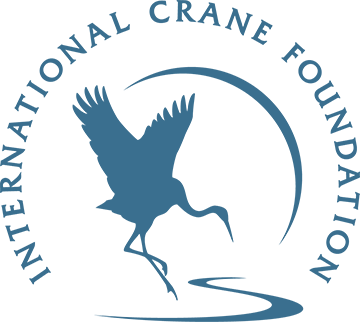

4/8/14: Media have been provided access to report first-hand on the Galveston Bay, Texas oil spill impacts and recovery efforts on Matagorda Island. The island is part of the barrier island chain that protects the wintering area for the last naturally occurring Whooping Crane population. Read the coverage from KHOU Houston (April 8, 2014): Oil spill clean-up: Ten tons removed from Matagorda Island.
4/2/14: Learn more about the response to the Galveston Bay oil spill at an informational session tomorrow (4/3) at 6:30 pm at the Port O’Connor Elementary School (508 Monroe Avenue, Port O’Conner, Texas). View more details on the public meeting.
The latest updates indicate that recovery efforts in the Coastal Bend region continue to require a large workforce and associated heavy equipment. ICF is heartened to read that the USFWS and Texas Parks and Wildlife Department are on-site to provide guidance and ensure that endangered species, such as Whooping Cranes, Piping Plovers, and sea turtles are not impacted by the oil or recovery activities. Read the Incident Command Center’s latest press release to learn more: Update 9: Matagorda Bay.
4/1/14: Clean-up continues along Matagorda Island in response to the oil spill in Galveston Bay, Texas on March 22. The latest update from the Texas City “Y” Response Unified Command notes that there are no reports of oil reaching Matagorda Bay: Update  7: Matagorda Bay.
7: Matagorda Bay.
3/28/14: If you are following the response to the oil spill in Galveston Bay, Texas, check out the following links for updates on activities to protect Matagorda Bay and the wintering Whooping Cranes.
Galveston oil washes up on Matagorda Island (Victoria Advocate, March 27, 2014)
Follow updates from the Texas City “Y” Response Unified Command: Update 2: Matagorda Bay
3/27/14: We are continuing to monitor the situation with the oil spill that occurred March 22 in Galveston Bay, Texas. A response team, including the U.S Coast Guard, Texas General Land Office and Kirby Inland Marine, has placed protective booms and other equipment to protect Matagorda Bay from the oil spill. We will keep you updated as we learn more.
Learn more:
U.S. Coast Guard press release, March 26, 2014
Oil spill response crews in Matagorda ahead of potential impact, North Texas e-news, March 27, 2014
Join the mailing list for the Texas City “Y” Response Unified Command for updates on the spill clean-up.
3/26/14: ICF’s Texas Program is monitoring the situation with the oil spill that occurred March 22 in Galveston Bay, Texas. The National Oceanic and Atmospheric Administration (NOAA) is predicting possible landfall of spilled oil on north Matagorda Island, along the Texas Gulf Coast, around midnight tonight.
Plans are underway to boom-off Cavallo Pass and several minor sloughs leading into the bays behind Matagorda Island. It is expected that some oil may still enter Matagorda Bay and could potentially put the wintering Whooping Cranes in this area at risk.
All agency partners in Texas are prepared to enact oil spill response and clean-up plans (learn more about Texas’ Oil Spill Prevention and Response Program). ICF will assist as needed to help protect the Whooping Cranes from any impacts caused by the spill. We will keep you updated as we learn more.
Learn more:
Oil spill puts wildlife in harm’s way, Houston Chronicle, March 26, 2014
As ship channel reopens after spill, cleanup shifts west, Houston Chronicle, March 26, 2014
3/25/14. ICF is concerned about the Kirby Inland Marine oil spill that occurred in Galveston Bay, Texas on March 22 (learn more about the spill). If prevailing winds and currents drive the oil spill southwest along the Texas coast, there may be a possible landfall of spilled oil along Matagorda Island and adjacent bays later this week. This could potentially put the endangered Whooping Crane at risk. An estimated 304 Whooping Cranes maintain their winter territories on the central Texas coast (including Matagorda Island); this is the only naturally occurring Whooping Crane population in the world.
Although the cranes are beginning their spring migration back to Canada, many Whooping Cranes are currently at risk in the Matagorda/Aransas National Wildlife Refuge area from the immediate impact of spilled oil. And any long-term impacts will continue to affect this recovering endangered species.
ICF is networking with the U.S. Fish and Wildlife Service and partners in Texas to track news about the extent and impacts (both short and long-term) of the oil spill. ICF will assist as needed to help protect the Whooping Cranes from any impacts caused by the spill. We will keep you updated as we learn more. Learn more about ICF’s work in the Guadalupe River basin in Texas.
